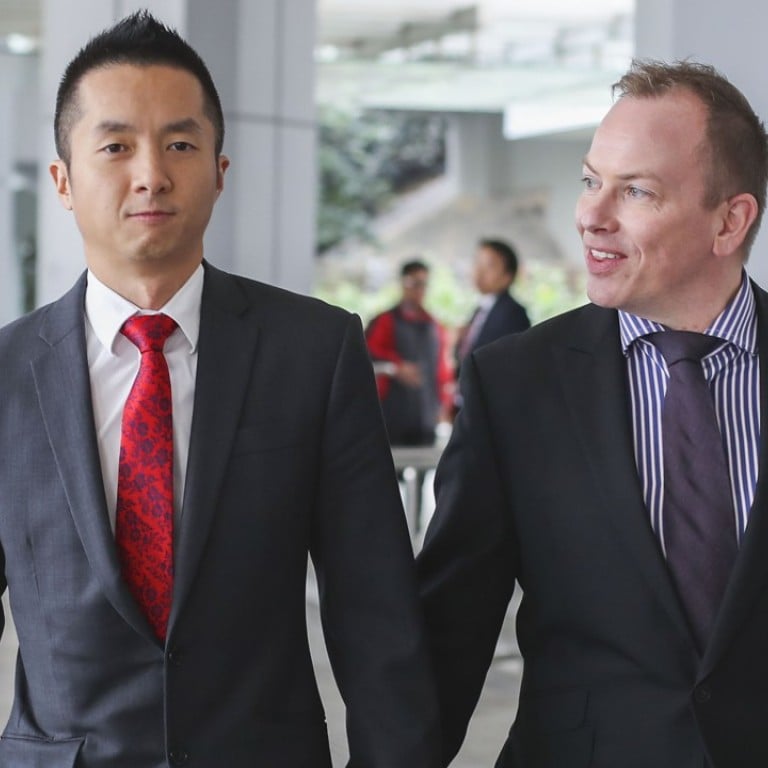
Government has ‘legitimate aim’ to protect traditional marriage, Hong Kong appeal court rules, overturning landmark decision on benefits for same-sex spouses
Angus Leung, the gay civil servant at the centre of the case, calls result a ‘huge step back for equality’
Hong Kong’s appeal court on Friday overturned a landmark judgment requiring the government to grant the same spousal benefits to employees in same-sex marriages as those enjoyed by their heterosexual colleagues.
In a blow to the city’s LGBT community, the Court of Appeal ruled that the government – as not just a private employer but “a custodian of Hong Kong’s prevailing socio-moral values” – had a legitimate aim to protect the institution of traditional marriage.
“By granting same-sex married couples ... access to spousal benefits, which are unique to marriage, the very status of marriage would diminish significantly in the eyes of the public,” one of the judges, Appeal Justice Jeremy Poon Shiu-chor, said in a written ruling, noting that people might think the government was recognising gay marriage via the “back door”.
Landmark win for gay Hong Kong civil servant over husband’s benefits
“The extension in the present case of the benefits and privilege under challenge would lead, almost inevitably, to similar extensions in other areas concerning, for instance, public housing, social welfare, public medical benefits, employment benefits and protection, pensions and life insurance,” Chief Judge Mr Justice Andrew Cheung Kui-nung said.
By granting same-sex married couples ... access to spousal benefits, which are unique to marriage, the very status of marriage would diminish significantly in the eyes of the public
Angus Leung Chun-kwong, a gay senior immigration officer, initiated a judicial review against the Civil Service Bureau in late 2015, after it refused to accept Scott Adams, whom he married in 2014, as his husband when he applied for spousal benefits. He won the case in April last year at the High Court, prompting the government to appeal.
“It is a huge step back for equality in Hong Kong,” a disappointed Leung complained in a statement following Friday’s overturning of the earlier ruling.
“We are not asking for special treatment. We just want to live our life fairly and with dignity.”
Leung said he would seek legal advice on whether to take his case to the city’s top court.
His court victory last year was hailed by LGBT supporters as a “rare judicial recognition” of the community.
But the vibe changed on Friday, when the three appeal judges handed down a 69-page ruling explaining why they had rejected the lower court’s position.
They said the present case centred on a balance to be struck between the government’s legitimate aim of protecting traditional marriage and the “inroads into Leung’s right to equality”.
Gay Games is Hong Kong’s chance to show the city’s inclusivity
Mr Justice Cheung noted that the case in Hong Kong was different from elsewhere because of the Basic Law, Article 37 of which stipulates that “the freedom of marriage of Hong Kong residents and their right to raise a family freely shall be protected by law”.
It was undisputed that the word “marriage” referred to the union between a man and a woman, Cheung said. He therefore concluded there was “a fundamental, constitutional backing” for the government’s legitimate aim.
To grant certain benefits to same-sex couples, Cheung said, “is to offend, challenge, question, confuse, or subtly change society’s established understanding and concept of marriage, which ... is rooted in its traditional, historical, social, moral or religious background and values, as embedded in Article 37 of the Basic Law”.
The court should therefore attach more weight to the constitutional backing and social preference for heterosexual marriage, he said.
LGBT community needs legal protection, not just awareness campaigns
Cheung warned of the risk of opening the floodgates if such rights were allowed to be extended. One should therefore look beyond what Leung had endured and turn to the implications that followed, he said.
Mr Justice Poon said the government’s position went beyond a “contractual role”, calling it a “custodian of Hong Kong’s prevailing socio-moral values” to justify its role in protecting traditional marriage.
Justice Cheung said unless there was an amendment to the Basic Law, or a new interpretation, Friday’s judgment would remain the court’s position. The third judge, Mr Justice Johnson Lam Man-hon, said it was up to society “to decide if the unique status of marriage should be expanded to provide for homosexual marriages”.
Leung’s challenge against the Inland Revenue Department was also unsuccessful.
The High Court had ruled earlier that the civil servant’s marriage status could not be considered for the purpose of taxation, and the appeal court on Friday upheld that ruling.
Raymond Chan Chi-chuen, the city’s only openly gay lawmaker, said he was “deeply disappointed” by the court’s “conservative judgment”.
“The court was making a judgment on morals when it said it must defend the existing marriage system based on the moral values of the majority,” he said.
“The court also argues that only the heterosexual majority enjoys the freedom of marriage. I do not agree with the narrow interpretation. In my view, human rights should never be decided solely by the majority of people.”
HSBC to allow same-sex couples to be insurance beneficiaries
A permanent Hong Kong resident, Leung joined the Immigration Department in 2003 and tied the knot with Adams on April 18, 2014 in New Zealand.
Leung’s solicitor, Mark Daly, said he feared the judgment was “reflective of, and is likely to embolden, anti-LGBT paranoia”.
“If this type of judicial analysis prevails, it does not bode well for minority rights and Hong Kong as an international city,” he said, adding that the judgment deviated from international human rights law and common law.

